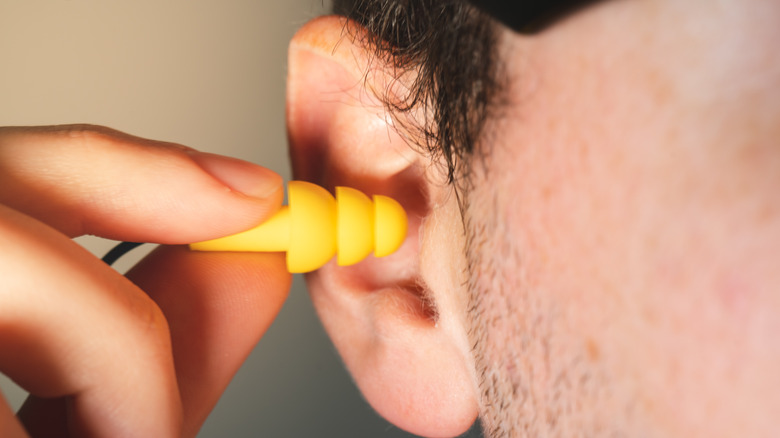What It Really Means When Your Eardrum Vibrates
It is normal to hear ringing noises in your ear after you've been exposed to a loud sound, like a raucous fireworks show on the Fourth of July. According to WebMD, the ringing sound you may hear after exposure to loud noise is your body's way of shielding the inner ear from harm — but what does it mean when you hear noises in your ear long after noise exposure, or even in the absence of an external stimulus?
If you experience a buzzing or ringing sound in your ear that is not coming from an external source, you are not alone. According to the Cleveland Clinic, tinnitus is a common issue for over 50 million Americans. Tinnitus occurs when you hear a noise in the head, one ear, or both ears. It can range from buzzing and hissing to ringing and whooshing (via National Health Service). Since these sounds do not come from an external source, they are often called "phantom sounds" (via Healthline).
Tinnitus can occur periodically, or it may be a constant source of noise (via Mayo Clinic). For some, tinnitus can negatively impact their quality of life. The vibrations in your ears can make it difficult to pay attention, and it's no surprise that the ringing noise may also keep you up at night.
If you feel anxious or frustrated with tinnitus, here is how you can cope with all that noise.
Tinnitus: causes, treatments, and prevention
Tinnitus is not actually a condition or disease, but rather, a common symptom of a variety of possible conditions (via the Cleveland Clinic).
According to MedlinePlus, tinnitus can be caused by a number of internal and external factors, including loud noise. Even the drugs you take, including non-steroidal anti-inflammatory drugs (NSAIDs) like aspirin, can lead to the ringing noise in your ears. Too much build-up of wax in your ear or an infection can also cause tinnitus, and it can be a sign of another condition.
While there is currently no known cure for tinnitus, several treatments do exist (via the National Institute on Deafness and Other Communication Disorders). Since tinnitus is a common symptom, your doctor may treat the underlying condition. For example, if your tinnitus is determined to be a result of ear wax build-up, your doctor may remove the wax (via WebMD). According to Healthline, certain medications can relieve the sound in your ears. If you do not want to experience any potential side effects, however, other treatment options include stress management counseling, cochlear implants, hearing aids, and sound masking devices.
More recently, scientists have been turning to the brain and neuroscience for answers. Since auditory patterns are ultimately established in the brain, some researchers are exploring treatments — like neural stimulation — that involve the reshaping of neural circuits (via the National Institute on Deafness and Other Communication Disorders).


